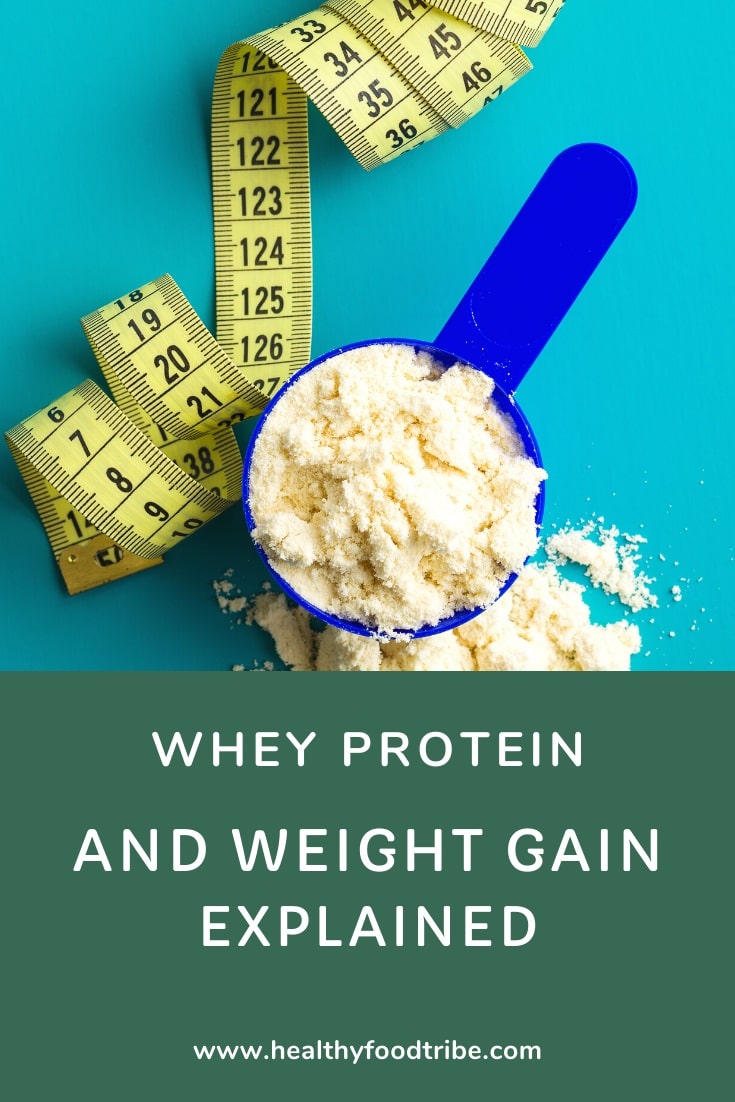Last updated: July 1, 2023
Can whey protein make you gain weight or even fat? This guide explains how whey protein fits into a balanced diet and workout regime.
The term whey protein is often associated with bodybuilding and weight lifting, as it is known to help build and repair muscle tissue. As such, whey protein is a popular nutritional supplement.
The question often comes up whether the consumption of whey protein can make you gain weight or even fat.
And the answer to that question is not that simple. So, let’s first have a closer look at what whey protein is and what its benefits are.
Quick navigation:
What Is Whey Protein?
Whey protein is the protein type that is isolated from whey, a watery substance that is a by-product of the cheese-making process.
It’s considered a complete protein that contains all nine essential amino acids. Depending on the type of whey protein (see further below), it is also low in lactose.
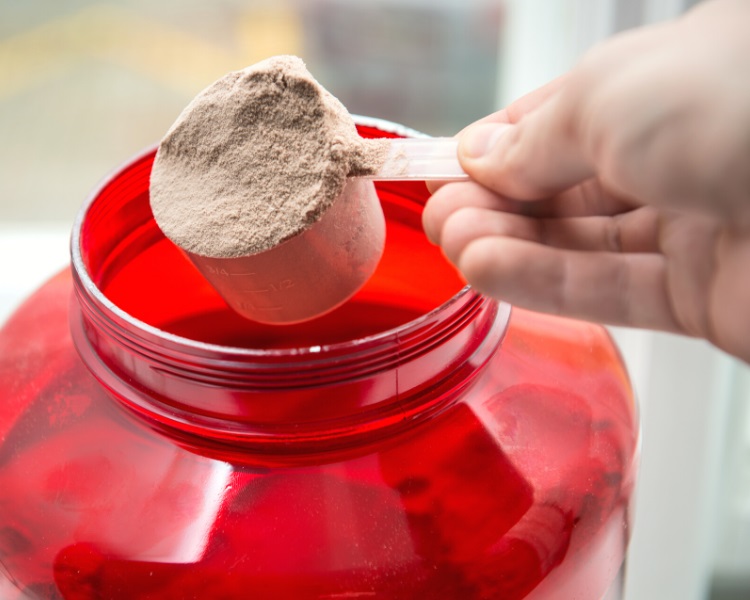
It’s often marketed as a food supplement to improve athletic performance, especially weight lifting and bodybuilding.
Whey protein is also often used as a milk replacement because milk contains lactose and casein and is therefore suitable for people with lactose intolerance.
Foods That Contain Whey Protein
There are quite a lot of different types of foods that contain some level of whey protein, so you don’t always need to rely on supplements.
Let’s go through some of the most popular foods that contain a good amount of whey protein.
Cheese
All types of cheese contain whey protein because of the milk processing, but some more than others.

Ricotta cheese, for example, has one of the highest amounts of protein content, around 28 grams per cup.
Milk
Milk contains both casein (slow-digesting) and whey protein (fast-digesting).
In addition, milk is also high in lactose and, as such, can cause gastrointestinal discomfort or other allergic reactions.
Yogurt
Yogurt comes from milk and therefore contains whey protein. Yogurt also contains probiotics that keep the bacteria in your gut healthy.
Make sure you get plain yogurt or Greek yogurt, as these are the cleanest yogurt products without additives. Plain yogurt contains around 12 grams of protein, and Greek yogurt up to 20 grams per cup.
Types of Whey Protein Supplements
There are, in fact, different types of whey protein, each with their own benefits, quality levels, and price tags.
Let’s take a look at the three main types of whey protein supplements.
1. WPC – Whey Protein Concentrate
This is the most standard type of whey protein that contains a high percentage of lactose (between 4 and 50%). The percentage of protein is between 25 and 90%, depending on the product. WPC is ideal for those just starting out with protein supplements and want to see how it helps with their workouts.
2. WPI – Whey Protein Isolates
This type of whey protein is the purest form that contains no lactose. The percentage of protein in WPI is between 90 and 95%. WPI is usually more expensive than WPC, but the quality is better and absorbs quicker than WPC. WPI is also ideal for those who are lactose intolerant.
3. WPH – Whey Protein Hydrolysate
Hydrolyzed whey protein is the most sophisticated and usually most expensive protein supplement available. WPH contains peptides (protein chains) that are more easily absorbable, even more so than with WPI. It can, however, contain a small percentage of lactose.
Keen to buy a good whey protein supplement? Read my guide to the best all-natural whey protein powders for some great options.
Benefits of Whey Protein
What are some of the benefits of consuming whey protein?
The main benefit of using (whey) protein is that it helps to increase muscle mass and improve athletic performance. Whey protein is a complete protein, which means that it contains all nine essential amino acids.
The human body cannot produce essential amino acids and must therefore come from the food we consume. Amino acids help us to perform better and build muscles faster.

Whey protein has also been shown to increase bone density. According to this study, whey protein stimulates osteoblasts and helps to activate the bone-building process.
Another surprising effect of whey protein is that it helps to reduce hunger. According to this study, consuming this type of protein results in a reduction of the hormone ghrelin, which is also referred to as the “hunger hormone”.
Potential Side Effects of Whey Protein
When you consume too much whey protein, more than your body needs or more than your body can handle, this can lead to adverse side effects.
It is a misconception to believe that the more whey protein you consume, the more muscle mass you will build up. Unfortunately, it doesn’t work that way.
On average, a healthy person should consume around 0.8 grams of protein per kilogram of their body weight.
When doing consistent strength training, this amount can be increased to 1 gram of protein per kilogram of their body weight.
Professional weight lifters and bodybuilders will consume much more than this because their training regime requires a higher amount of protein.
What are some potential side effects of consuming too much whey protein?
-
Development of kidney stones:
Kidney stones are calcium deposits in your kidney that your body needs to get rid of (you need to pee them out). People on a low-carb and high-protein diet may be more vulnerable to developing kidney stones. You can prevent this with a balanced diet and moderate whey protein intake. -
Stomach pains and constipation:
This appears to happen frequently, especially when you are just starting out with whey protein supplements. If you’re mixing whey protein with milk, maybe try water instead to reduce the irritation. -
Bloating:
This is also a side effect that appears to be common with people who take whey protein. It’s not something to worry about, and it will eventually go away.
Other commonly reported side effects are headaches, migraines, fatigue, and loss of appetite.
High-protein smoothie recipes.
Whey Protein Alternatives
Whey protein is not the only protein powder type you can use as a supplement. Here are some other popular protein powders:
1. Casein Protein Powder
Unlike whey, casein is a type of protein that your body breaks down very slowly, usually somewhere between 5 and 10 hours. Casein is therefore not very suitable as a supplement post-workout because your body is in need of quick nutrients in that situation.
Casein is often used as a meal replacement, and because it breaks down slowly, it’s ideal to consume before going to bed. Other than that, casein and whey are very similar protein types. Both casein and whey come from dairy products.
2. Soy Protein Powder
Soy protein is a good choice for those who are lactose intolerant or for vegans, as it’s entirely plant-based. The downside of soy is that it’s heavily processed and often genetically modified.
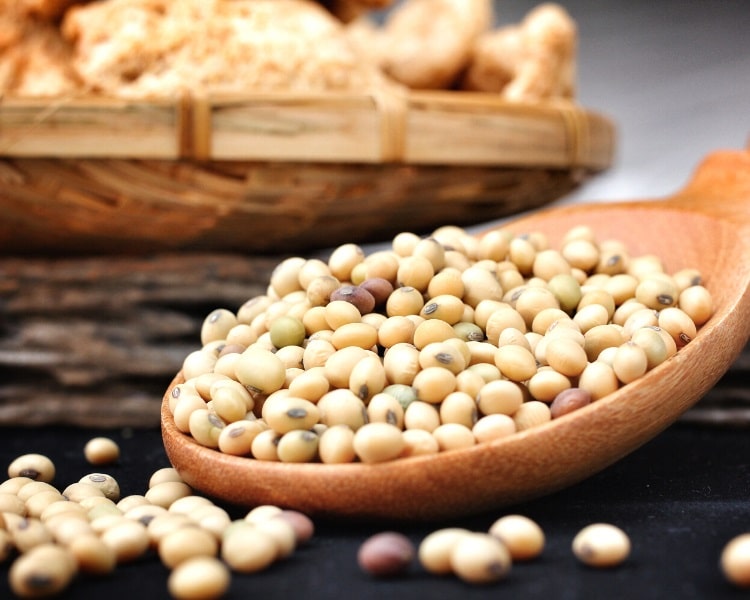
Like whey protein, soy protein contains all your essential amino acids and is therefore considered a complete protein.
3. Hemp Protein Powder
As the name suggests, hemp protein is derived from hemp (cannabis plant) seeds. While hemp protein is not a pure source of protein, it’s still considered a complete protein, rich in omega-3 and omega-6 fatty acids, perfect for vegetarians and vegans.
It’s also an expensive protein powder as cannabis is not grown on a large scale and often needs to be imported. Hemp protein is still a relatively new product on the market.
4. Brown Rice Protein Powder
Yes, brown rice also contains protein.
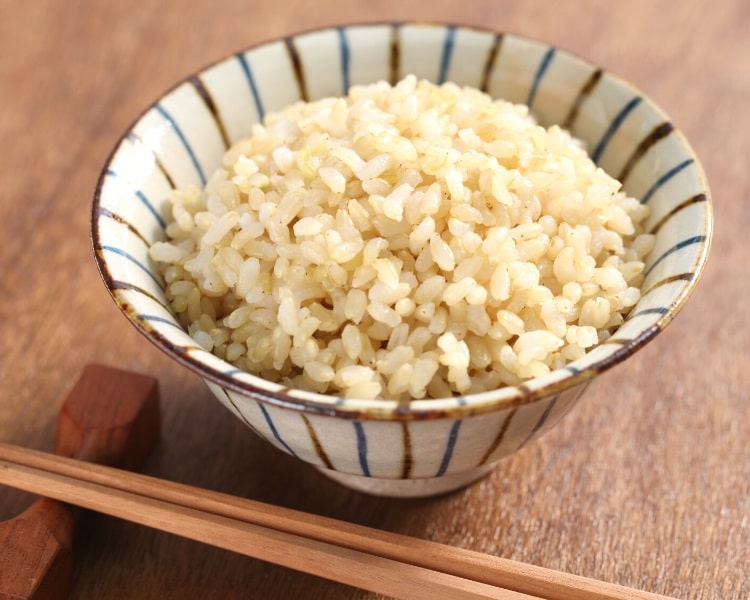
While protein from brown rice is not a complete protein, it’s considered a healthy protein option, high in complex carbohydrates, B vitamins, and fiber.
5. Pea Protein Powder
Even peas contain protein. Pea protein powder is 100% plant-based, fat- and cholesterol-free, and it’s affordable too.
However, pea protein isn’t a complete protein, so it should be paired with other protein sources.
Does Whey Protein Make You Fat?
No, whey protein doesn’t make you fat. Whey protein itself will not make you fat or gain weight because there is nothing in it that actively causes an increase in fat storage. Whey protein is simply a type of food, just like eggs, chicken, and fish.
Combined with a proper workout regime, whey protein can certainly make you gain weight. But this is because your muscle mass is increasing and your body fat is decreasing, which can result in a net weight gain.
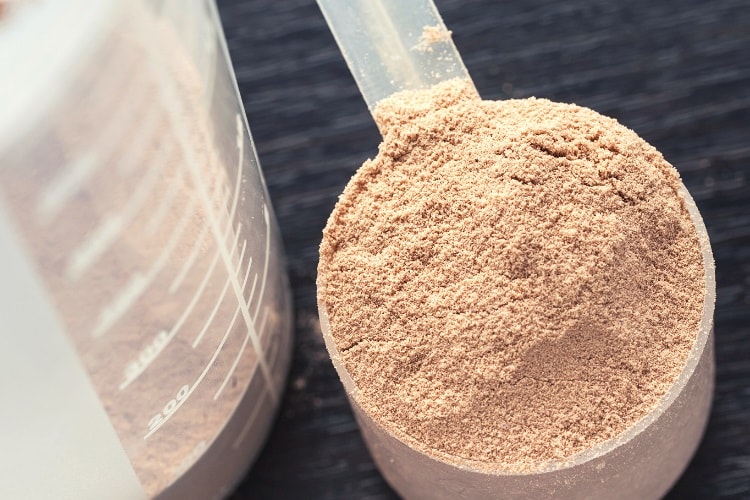
Protein deficiency, on the other hand, can lead to weight loss but for all the wrong reasons. Protein deficiency will lead to muscle wastage because your body is trying to get protein from your muscles. This can then result in weight loss, but this is obviously not the type of weight loss you should aim for.
Whey protein is an essential nutrient that plays an important part in a balanced diet. Protein helps to increase and maintain muscle mass and helps strengthen bones. Moderation is key with everything, and the same applies to whey protein.
